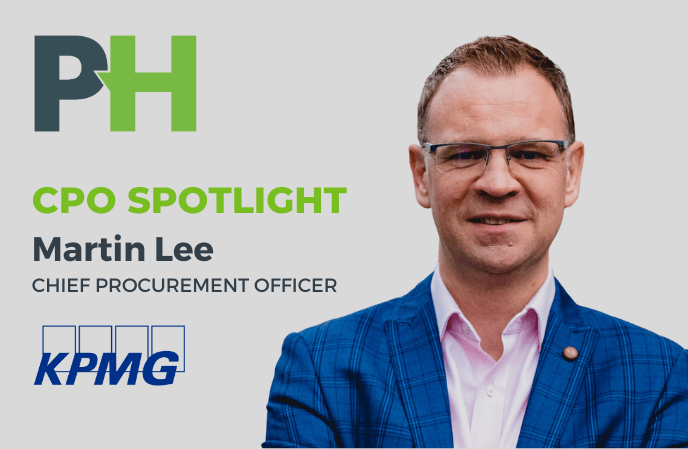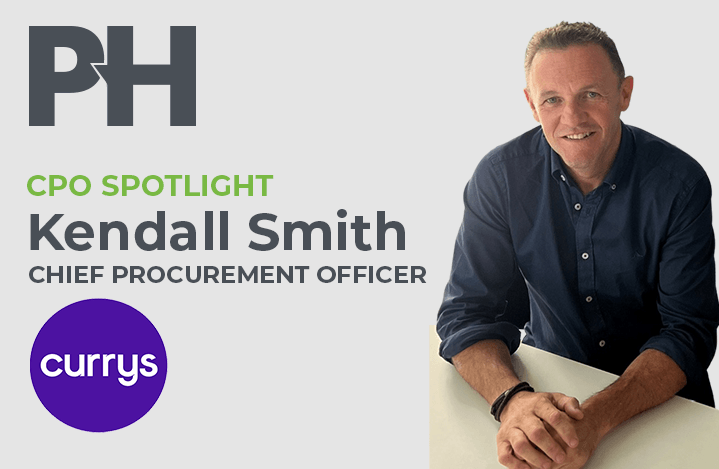Driving Change: A Conversation with Martin Lee, CPO at KPMG, on Procurement, Sustainability, and Leadership
Martin Lee is Chief Procurement Officer at KPMG, and fellow member of the Sustainable Procurement Pledge. He caught up with James about his career and thoughts within the CPO role.
You joined Ford Motor Company back in 1995, straight from A Levels, what made you choose a career in procurement, and could you tell us about your career journey so far?
Back in 1995, I was just considering what I should do at university, with the thought of going to uni not really clear in my head.
At the front of the UCAS book at the time, was a degree apprenticeship with the Ford Motor Company in purchasing and logistics, aptly titled PLUGS – Purchasing and Logistics Undergraduates.
I thought it sounded really interesting, I loved the idea of earning money, working in business and I also had that question mark in my head; was university really for me?
I was successful in joining Ford as one of five on a 4-year programme.
Interestingly, that type of scheme is still rare across our industry, which I think is a major lacking currently in attracting and developing new procurement talent.
Did I know what procurement was at the beginning? I had no idea!
It sounded really cool, getting involved in buying the stuff that goes in the vehicles.
Having gone through a programme of directs, indirects, technical quality and production planning, I ended up buying indirects and really that was my lead into what procurement really does for a company.
It’s where I fell in love with the idea of negotiation, bringing stuff to fruition, bringing it from the idea, with the supplier and seeing it become the end product.
That was my start in Procurement, and I have never left since.
Moving on through my career, I focussed on the Technology category within organisations such as BAA & Proxima (buyingTeam), before moving to KPMG in 2010.
It is here at KPMG that I was able to grow into my Chief Procurement Officer role, taking leadership of the overall function within a complex regulated industry, to help the organisation achieve its strategy to be the fastest growing, most connected, and most trusted firm.
I love the CPO role and what the Procurement team does for the organisation – helping source, transact and run supply chains that make a material impact to our success, and now more than ever to our ESG impact too.
You clearly place a lot of value on Continued Professional Development, having completed MCIPS in 2007, a Master’s degree in Global Supply Chain from the University of Southampton and then an Executive Certificate in Advanced Sustainability from New York University.
Do you think the desire to learn is a key facet of being a successful CPO?
Definitely. Learning for me is critical because I think it expands your thinking, it gives you a great way of trying to approach different challenges in different ways.
It also expands your possibilities from the point of view of broader networking, and learning from different industries. Throughout my career I have taken the opportunities to try and expand myself to do those things wherever possible.
My Master’s in Global Supply Chain was actually taken from when I was working in IT. At the time, I was doing a commercial masters because it was also contributing to the IT function, with a focus on how to be more commercial.
The connections and breadth of insight were brilliant, including learning from fantastic examples across industries. Knowing that you can pull the thread of ideas or approaches into things, you can then use it in your own position.
Your career has seen you take on cross-sector procurement roles to where you are now at KPMG, how has this diverse portfolio of roles helped you in your career in terms of getting to that CPO level?
The first thing is you learn that procurement is one of the most transferable skills – the approach, the thinking, and the way you look at things commercially is adaptable and transferable across industries.
As you go across these industries you see the different challenges and the different ways to approach those challenges, which I think helps to broaden your kit bag ready for new challenges.
It also gives you a good background to be able to help other people work through different challenges.
You are a strong proponent of diverse and sustainable supply chains. What role has procurement played in KPMG’s sustainability journey?
This is critical. I’ve spoken elsewhere previously about how the Procurement of old used to be mostly focussed on price and product.
We are now definitely moving towards the impact across the people and planet agenda.
With a large part of an organisation’s spend driven through the supply chain, we are absolutely critical.
I believe we have a great opportunity to be able to influence not just how we buy, but also what we buy – from whom and how we operate, to achieving a materially better outcome from a sustainable perspective.
I have been fascinated to see the pace of the recent evolution of procurement, especially towards that sustainability agenda. At KPMG, we have been running a Sustainable Procurement programme for over a decade. I can see how this is now really shifting beyond an initial evangelistic approach, to one of material positive sustainable change.
KPMG were included in CPD’s supplier engagement leader board, representing the top 8% of the industry for supplier engagement on climate change, what does this mean to you and your team to achieve this recognition?
It is interesting, as it provides a level of validation that we are focusing on the right things in the right way.
I believe it gives us a platform to continue to talk to our top suppliers and our wider supply chain in a credible manner.
The other part of this is that it is also very much about amplifying procurement’s voice internally to support the ESG agenda, aligned with our wider values. It also provides credibility with our client-facing teams – when we are out in the market, we know that we can demonstrate living our values.
You are a fellow member of the Sustainable Procurement Pledge, how crucial are organisations like the SPP for driving awareness?
This is already, and will continue to be, a critical component of the way the Procurement industry operates. This is something I have seen explode over the last few years.
As the ESG agenda becomes mainstream, and as the way of communicating dramatically changes through the digital era, I think that is a positive way of ensuring wider engagement to do good.
The reality is that the changes and the impact we all need to make cannot be made alone. We need to work together collaboratively across industries and across supply chains, acknowledging that this is still a highly underdeveloped area.
I would also say that groups like these are also fantastic for raising the profile of our profession, both internally and externally. They help to create a platform for people to learn and develop new skills, drive change, achieve credibility and attract talent.
Within a profession that is rapidly evolving with new jobs that didn’t exist years ago, these groups help to further position the Procurement function as a leader of change, rather than a recipient.
What are some of the biggest challenges facing CPOs at the moment?
The first thing to acknowledge is that we live within a world significantly impacted by the polycrisis. There is no way of avoiding this and it’s impact to our lives, our businesses and our roles.
This environment means we constantly have to juggle competing priorities, at the same time as also knowing that we must make a fundamental impact to our sustainability agenda.
The second point I would say here is that along with the evolution of the ESG agenda, and growth in the success of the Procurement profession, comes the challenge of finding and developing talent. This is particularly true in regard to that new blend of commercial and supply chain sustainability.
My third point relates to the hybrid working environment and how we can get the best out of our teams. How do we recruit, retain and motivate people?
This balancing act of competing priorities, emerging talent, higher corporate expectations and greater need for impact is definitely going to be critical over the next few years – for all Procurement teams.
For so long we have asked for a voice, an opportunity to make an even greater impact, so now we must continue to deliver on this.
What advice would you give an aspiring CPO?
If you are in a category lead role or other type role, moving up to a CPO, one of the greatest challenges is stepping out of the doing, and moving up to being a leader. You have to let go and focus on enabling your team to deliver.
The key is to engage more broadly, both internally and externally. Internally to really understand where the organisation’s challenges are and where it is heading. Externally, engage with movements like the SPP and the broader Procurement profession, while bringing this back and applying this internally.
Another of those common issues is the fear of the unknown.
The reality is, you need to recognise the transferability of Procurement skills – those skills that you developed in the early stages of your Procurement career really do set you up far better than you think. We need to be more ambitious and trust that we can deliver.
My final piece of advice is to work in an environment that has a supportive culture, one that allows you to take appropriate risks and make change, without fear of the impact of failure. I believe the greatest opportunities for success can be created this way, for the individual, the team, the organisation as well as the wider external environment and industry.
Interested in finding out more about the Sustainability pledge, read on here.





